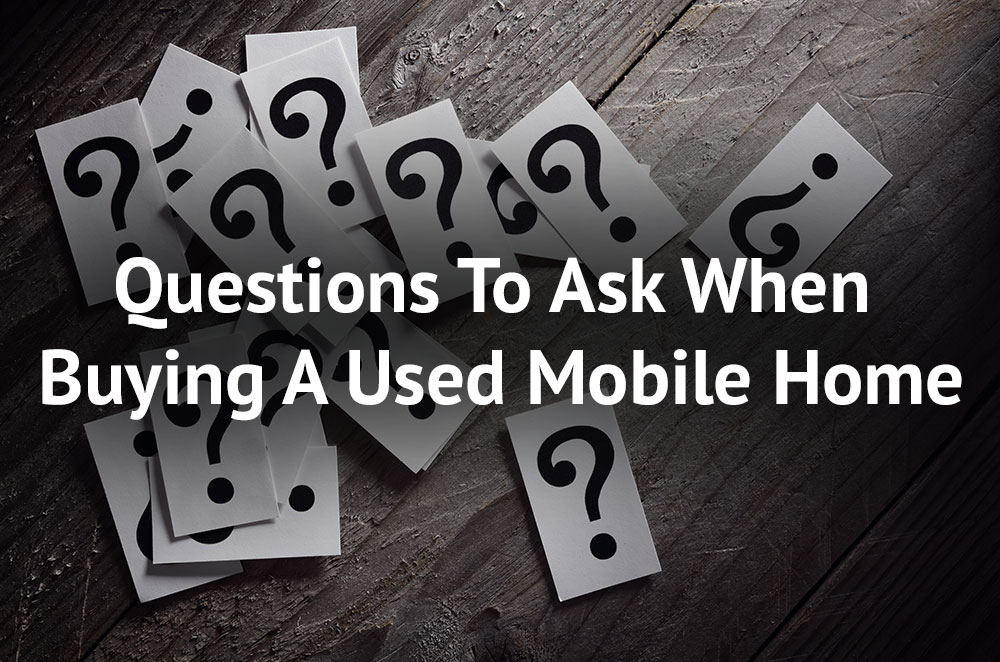
Texas has seen a steady increase in mobile, or manufactured, home numbers throughout the state. Though it may seem intimidating, buying a mobile home in Texas can be extremely easy once you have a solid idea of what you’re looking for and how to do it.
If you’ve ever looked at a map of the United States, you’ve probably realized that Texas is, geographically, the biggest state on the map. Though certain areas are extremely populated, there are other areas that people are moving their mobile homes into every day.
Important Mobile Home Terminology
When on the hunt to buy a used mobile home in Texas, there are a few terms you need to keep in mind to distinguish what it is you’re really buying and if it will be a good fit for you and your lifestyle. You can buy manufactured homes brand new or pre-owned, but always make sure to do your research before ever locking into and finalizing a sale.
Factory Built
As the name suggests, this term means that the home you’re looking at purchasing a home built partially in a factory. The building codes these structures follow bring them up to local, state, or federal building levels and these homes had construction completed onsite.
Modular Home
A modular home is essentially the same as factory-built housing, as the building codes and construction process are identical for both categories. However, these homes are larger and have multiple sections for them, which leads to a little more paperwork down the line.
Manufactured Home
In June 1976, the Housing and Urban Development Code (HUD) set a new standard for constructing and maintaining manufactured homes. The HUD Code, or the Manufactured Home Safety and Construction Standard, makes manufactured homes different in a few ways.
The phrase “mobile home” tends to reference anything built prior to the establishment of this code. “Manufactured homes” in compliance with the HUD Code must meet federal construction standards, durability tests, fire resistance tests, energy efficiency, and so much more.
While the two terms aren’t necessarily interchangeable, it’s common for people to use them interchangeably. When buying a mobile home in Texas, always make sure you’re getting all the information you need about the home, especially if someone else has owned it previously.
Mobile Home Safety
Though they may seem intimidating, especially given that the HUD Code was not incorporated until the late 1970s, the risks associated with owning and living in a mobile home are no different than that of a site-built home.
Are Manufactured Homes Safe in Texas?
The HUD Code ensures that manufactured homes are up to date and fully functional, so living in a home like this means you have no more at risk than if you lived in a site-built home. Mobile homes are no more susceptible to fire or inclement weather than any other home.
In fact, site-built homes are more than twice as likely to experience a fire than manufactured homes. HUD Code requires they make mobile homes with fire retardant materials and smoke detectors, not to mention large bedroom windows.
How to Buy a Mobile Home in Texas
MobileHomeHQ makes buying a mobile home in Texas fast, efficient, and easy, but there are a few things to keep in mind whenever you’re looking to purchase a manufactured or mobile home. There’s much more to this process than simply buying and placing a home.
We’ve already covered the safety risks, or lack thereof, of manufactured homes, but we’ve got plenty more information in store. We’ll go over an in-depth look at how to buy a mobile home in Texas, how they’re taxed and financed, their setup requirements, and if mobile homes are considered real property in Texas.
Additionally, we’ll even do a brief overview of Texas’s mobile home titles and how they are transferred between parties.
Our information is comprehensive, precise, and will help you start, or continue, your journey into manufactured home-ownership.
Mobile Home Setup Requirements in Texas
It’s imperative that you check the zoning regulations of where you’d like to place your manufactured home because many areas still limit where you can place these homes. However, because the design has changed so drastically throughout the years, many places have realized mobile homes cannot be differentiated from site-built homes and allow them in their communities.
The Texas Department of Housing and Community Affairs, or TDHCA, and HUD must approve any mobile home built in Texas. Much like site-built homes, mobile homes are subject to the same zoning laws. To apply for the rights to set up a manufactured home, you have to do so through the TDHCA in the city you’re looking to move to.
There are forms and fees new manufactured homeowners must complete and pay. You must fill out a Notice of Installation and pay a $75 reporting fee to the TDHCA no later than seven days after you have installed your home. Every additional section adds $25 more in payment.
Mobile Home Title Transfers in Texas
We’ll keep this section brief, but essentially, mobile homes no longer require a traditional housing title. In 2003, this changed, so manufactured homes now require Statements of Ownership instead, and it includes all the information a traditional title would require.
However, the Statement of Ownership also denotes whether the home is personal property or real property and the home’s location. If you sell your mobile home or change its location, you must update your Statement of Ownership through the TDHCA.
Is a Mobile Home Real Property?
Mobile homes are much more popular across the United States than many people realize. Manufactured homes can be either personal property or real property depending on where you live in the U.S. and if it meets certain criteria to become real property.
Is a Mobile Home Considered Real Property in Texas?
The answer is both yes and no. If the home is not permanently anchored to a piece of real estate, it is technically personal property. Once it’s affixed to a real estate area, it becomes real property.
How are Mobile Homes Taxed in Texas?
The answer comes with a bit of nuance, but we’ve got the answers you need. Manufactured homes are subject to sales tax, whether buying a new or pre-owned home.
Mobile homes are also subject to property taxes, which the owner of the home must pay. If you own the home but not the land it’s on, you’ll probably end up paying personal property tax on the manufactured home to the Texas motor vehicle department.
If your home is permanently affixed to the real estate plot and you own both the land and home, it’s no longer subject to personal property tax.
Instead, because it’s considered real property, you’ll pay real estate tax on it.
Insuring a Mobile Home in Texas
Insurance can be tricky when it comes to manufactured homes. Buying a mobile home in Texas can be extremely easy, but you cannot insure it according to state law if you only own the home. The only way you can insure your mobile home is if it’s considered real property.
The process of converting a mobile home from personal to real property is fairly straightforward.
First, you must remove all aspects that make the home “mobile” (the wheels, axles, etc.), and it must gain fixations to permanent facilities.
Second, you have to turn in the title to the TDHCA.
In addition to being able to insure the home, other benefits come with converting a manufactured home from personal to real property. Namely, owners can fully take advantage of real estate loan documents rather than consumer loans that come at a higher cost.
Manufactured Home Bill of Sale
As the name implies, the bill of sale proves that the sale of a manufactured home between the buyer and seller is legal.
However, before you file this paperwork, you need to check a few crucial things to make sure everything is in order.
Bill of Sale for a Mobile Home in Texas
The bill of sale functions the same way in Texas as it does throughout the United States. In fact, if you don’t want to write your own, there are plenty of templates on the web that you can download and use for free.
Here is our mobile home purchasing essentials checklist:
- Check for taxes and liens
- Check for seals or labels
- Get the proper paperwork
- Do multiple walkthroughs of the property
Check for Taxes and Liens
Luckily for mobile home buyers, all manufactured home records in Texas are in an online database. This information source keeps all records up to date, including any back taxes or liens owed to the home. All taxes must be current before they can transfer a title.
As long as you have the home’s serial or seal number, you can verify if the taxes and liens are current. If you want to be particularly cautious, you can even call the TDHCA and double-check to verify that everything in the database reflects their actual records.
Check for Seals or Labels
As mentioned, mobile homes have seal numbers that verify that the HUD has a home register on file. Each section of the home requires a different Texas Seal or HUD Label. If you’re looking into buying a double-wide manufactured home, it would have two Seals or Labels.
Texas law requires that each mobile home has a HUD Label or Texas Seal on it prior to purchase. If the home you’re looking into purchasing doesn’t have the Label, it’s okay. To get each section of the house recognized, it’s $35 per section. So, a double-wide would cost $70.
Get the Proper Paperwork
Closing on a mobile home is no different than closing on a site-built home when it comes to essential paperwork. However, the documents required for a manufactured home do not require any notary services.
You’ll need the SOL (Statement of Ownership and Location) application, a Tax Receipt or a Statement from the Tax Assessor-Collector (to notate that all taxes are current), and a Bill of Sale, which can be made with a template or by hand.
Do Multiple Walkthroughs of the Property
Though it says “property,” we are referencing the home itself and the property it will be on. If there’s extra trash or furniture that needs to be removed from the premises, you’ll want to renegotiate the price with the seller because that’s unacceptable.
Additionally, make sure that you inspect the home once you’ve moved in, and note any items that don’t function as they should or don’t look right. You’ll need to check your warranty and make sure any repairs necessary are covered. Always hire a professional to work on your home.
Mobile Home Financing in Texas
Luckily, financing the purchase of a manufactured home functions very similarly to buying a site-built home. There are a few different ways you can complete your purchase, and each has its unique advantages and disadvantages.
Similar to site-built homes, you can put a down payment on a manufactured home, around 5-10 percent of the sale price, and have a loan term of about 15-30 years, depending on how much you pay upfront and how much you pay per month.
Suppose you’re purchasing a mobile home and the land it’s on as a bundle or planning to put the home on your own property. In that case, you may be able to find some competitive real estate mortgage rates and interest rates from financial institutions.
However, if you’re buying the mobile home separate from the land and it will remain on that same property, it will be considered personal property and not real estate, as we mentioned before. With that in mind, you’ll likely have a higher interest rate on a personal property manufactured loan.
Buying a Used Mobile Home in Texas
With anything in life, there are learning curves and caveats. Real estate is one of those areas where the market constantly changes and requires you to adapt, but we tried to make things as simple as possible for you with this guide.
Real estate is an investment, and mobile homes are no different, even if they’re considered “personal property” in the eyes of the law.
Doing your research and finding reputable sellers, like MobileHomeHQ, make your buying process a breeze.



